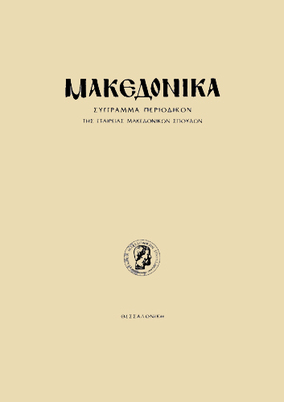Τα εφυαλωμένα αγγεία των Φιλίππων : Η συνέχεια μιας παλαιάς τεχνικής
Part of : Μακεδονικά ; Vol.37, 2008, pages 21-45
Issue:
Pages:
21-45
Parallel Title:
The Glazed Pottery of Philippoi : The Succession of an Old Technique
Section Title:
Articles
Abstract:
The article deals with the glazed pottery found in the early christian cityof Philippoi (North Greece). During the excavations conducted by the Aristotle University of Thessaloniki, from 1988 to 1994, a great amount of glazedKitchen Ware and pitchers were found. The glazed pottery of Philippoi is dated back to the 5th and 6th c. and continues a tradition that goes back to roman period, since Philippoi was a roman colony of the second half of the 1stc. B.C. At the same time, a well organized glassworkshop was found inside theearly christian city, providing us indications for the existence of a dynamiceconomy, which permits the function of workshops inside the city. The products of those workshops satisfy the entire or a great part of the needs of thecitizens.The glazed cover of the Philippoi pottery is of various qualities as well asof colours which vary from dark or light oil-green and dark oil-brown, to yellow, yellow-brown or dark brown. Generally speaking, the glazed cover iswell attached to the ceramic material, covering the external surface. This, among other things, leads us to the conclusion that the glazed pottery ofPhilippoi follows the 4th and 5th c. traditions of various regions of RomanEmpire, bearing no immediate resemblance to the pottery of the same timethat comes from Constantinople (Saraçhane).The presence of the external glazed layer on Kitchen Ware favors thelack of humidity during the preparation of the food. On the other side, we cansuggest that the glazed cover of pitchers meets probably the satisfaction ofaesthetic needs rather than practical, though we cannot completely be sureabout that.The glazed pottery was probably an alternative to the usage of glass objects since the new conditions, after the 4th c. recognition of Christianity asthe official religion of the empire, created enormous demands for glasswareused in the ecclesiastical and private worship. As a result, we may assume thatthe glass and glazed ware are two parralel and different ways to cover theeveryday needs of households and churches.
Subject:
Subject (LC):
Notes:
856:https://ejournals.epublishing.ekt.gr/index.php/makedonika/article/view/5608, DOI: http://dx.doi.org/10.12681/makedonika.45
Electronic Resources:




